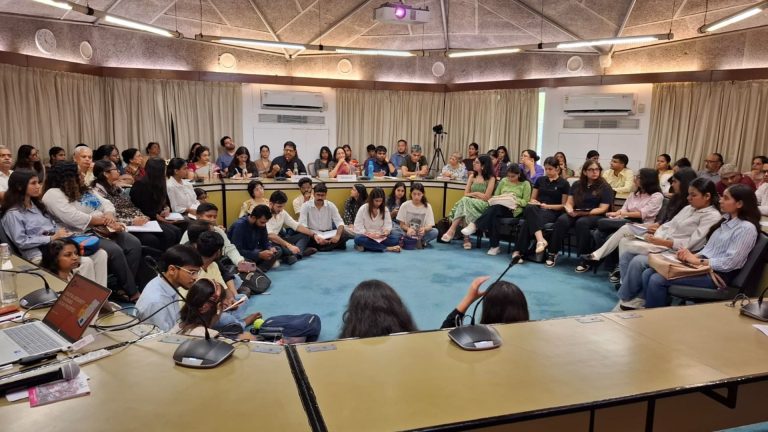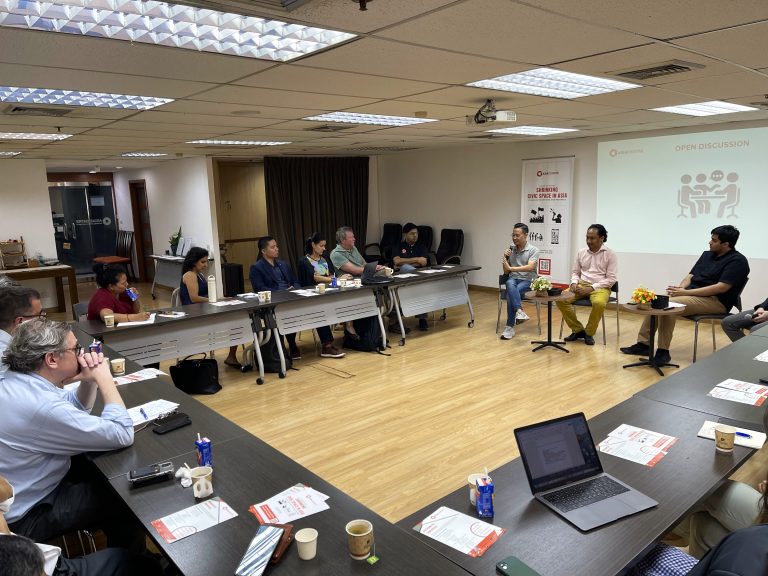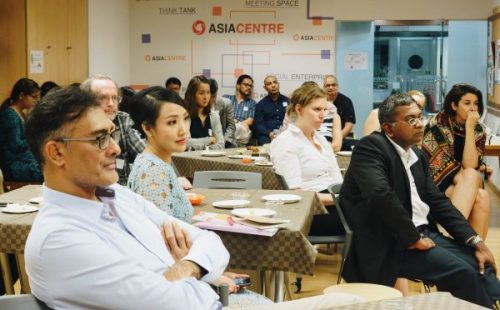The discourse on AI governance has been dominated by governments and the private sector, leaving civil society sidelined. To build genuine AI Public–Private–People Partnerships, civil society organisations need to be accorded a seat at the table. But to do this, they need meaningful cross-sector support to develop the capacities and resources necessary to safeguard democracy and human rights in the era of AI.
This was the main message from Asia Centre’s 10th International Conference, “AI and Governance in Asia: Civil Society, Democracy and Media”, held 21 to 22 August 2025 at the VIE Hotel, Bangkok, Thailand.
The Conference convened 50 participants from 16 countries, comprising representatives from international non-governmental organisations (INGOs), civil society organisations (CSOs), diplomatic missions, policymakers, legal professionals, academia, and the broader private sector – the majority of whom were from the technology industry. Over two days, a total of seven panels and one “fireside chat” session were convened, featuring 38 speakers, with a gender balance of 50% men and 50% women.
It fostered cross-sectoral dialogue on the opportunities and risks AI presents, highlighting the need for inclusive governance that empowers civil society and safeguards democratic values. Together, the stakeholders examined how artificial intelligence is reshaping civic engagement and its implications for democratic and human rights.

This year’s conference was supported by three (3) title partners:
- Taiwan Foundation for Democracy (TFD)
- International Institute for Democracy and Electoral Assistance (International IDEA)
- The Asia Foundation (TAF)
The Conference also featured two (2) partners:
- Eugene Thuraisingam LLP
- Global Democracy Coalition
Day 1 | 21 August 2025
The programme opened with a pre-recorded message from Pita Limjaroenrat, former Prime Minister-designate of Thailand, who underscored the importance of ensuring that AI serves as an “equaliser” for society rather than a technology that fosters “exclusion”. View the message here.
Dr James Gomez, Regional Director of Asia Centre, opened the Conference by framing it as a space to confront the pressing exclusion of civil society groups from discussions on AI. He highlighted how AI governance remains dominated by governments and the private sector, expressing concern that local civil society groups are being sidelined, which leaves them disadvantaged and limits their ability to contribute meaningfully to AI debates and ensure that AI can serve to promote democracy and human rights in the region.
Dr Gomez also announced the launch of the AI Hub for Democracy and Human Rights to sustain these efforts beyond the Conference. The Hub will focus on three core areas: researching the ways AI has already – and will continue to – impact democracy and human rights; strengthening the capacity of civil society organisations through AI literacy and practical AI tool adoption; and advocating for democracy and human rights compliance with technology companies, governments and other stakeholders in an era of AI. Read more about the AI Hub here.
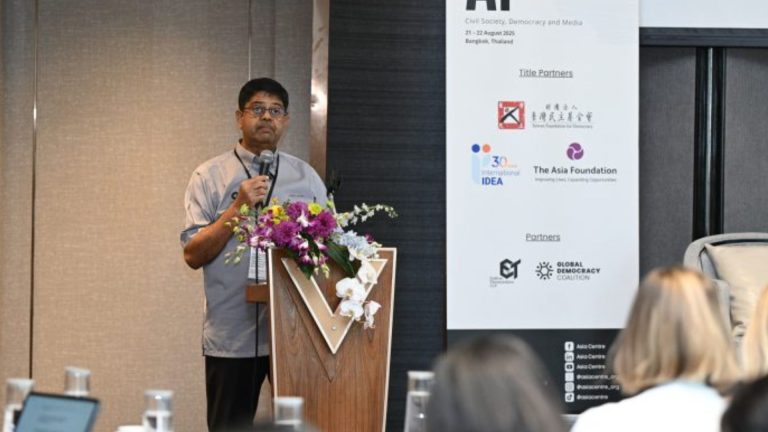
This was followed by statements from Leena Rikkilä Tamang, Director for the Asia and the Pacific region at International IDEA and Thomas Parks, Vice President, The Asia Foundation.

Three panels were convened on the first day, addressing a diverse range of topics, including the implications of AI for democracy in Asia, the future of tech-enabled governance in Southeast Asia, and strategies for building accountable AI through cross-sector collaboration. The panels were as follows:
- Panel 1: “AI and Democracy in Asia: Opportunities and Challenges”, hosted by International IDEA
- Panel 2: “Governance 4.0: What is the Future of Tech-Enabled Governance in Southeast Asia?”, hosted by The Asia Foundation
- Panel 3: “Public–Private–People Partnerships in AI: What Makes Cross-Collaboration for Accountable Technology Work?”
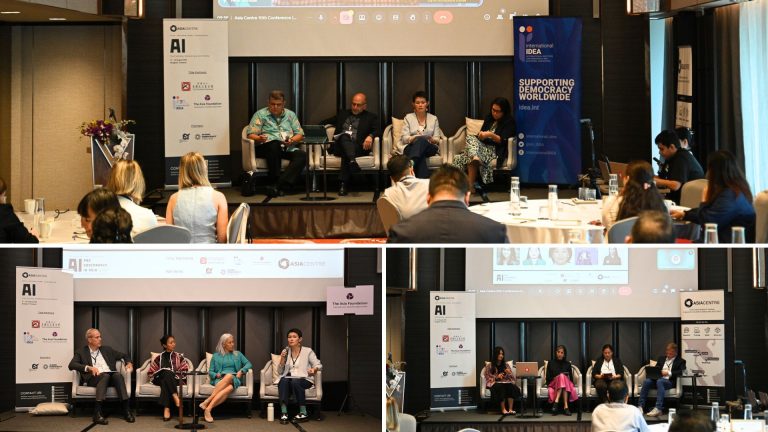
A fireside chat entitled “A Dialogue for the Future: Technology, AI, Democracy and Peace”, was also held with Abhisit Vejjajiva, the 27th Prime Minister of Thailand and Dr. James Gomez, Regional Director, Asia Centre. Khun Abhisit shared his perspectives on the rapid advancement of technology and its far-reaching implications. The discussion also explored the role of technology in democracy and peace.
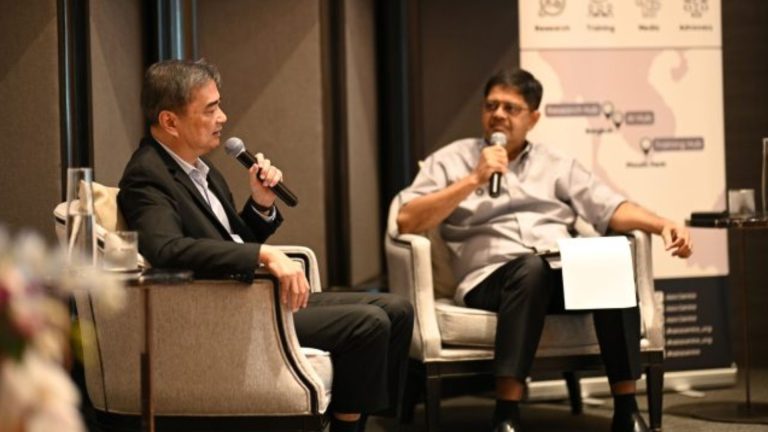
Day 2 – 22 August 2025
The second day featured four additional panels on safeguarding media integrity in the age of AI, adapting AI technologies to regional contexts, developing trusted AI through innovation and regulation, and exploring the broader societal impacts of AI:
- Panel 4: “AI and Media Integrity, Resilience and Sustainability”
- Panel 5: “AI Adaptation in Asia and the Pacific”
- Panel 6: “Towards Trusted AI: Innovation Landscape and Regulatory Frameworks in Thailand ”
- Panel 7: “Rethinking Technology for Collective Impact: AI in Society and the Path Ahead”
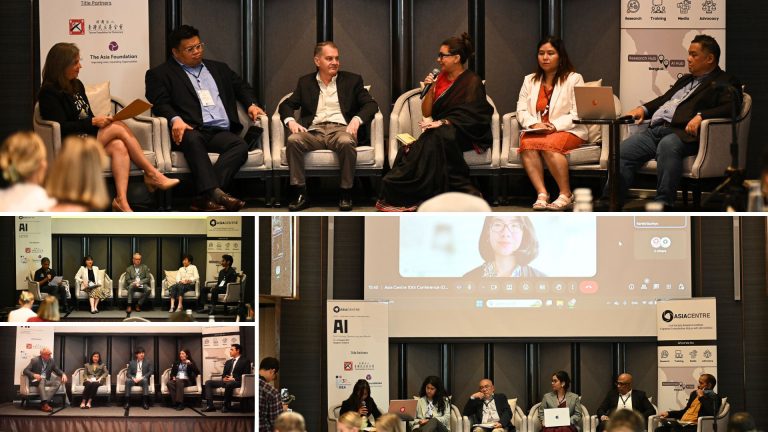
Dr Gomez officially closed the Conference by expressing Asia Centre’s appreciation to all speakers and participants. He also announced Asia Centre’s 11th International Conference, titled “Religious Freedom in Asia: Representation, Restrictions, Rights”, which will be held from 19 to 21 August 2026
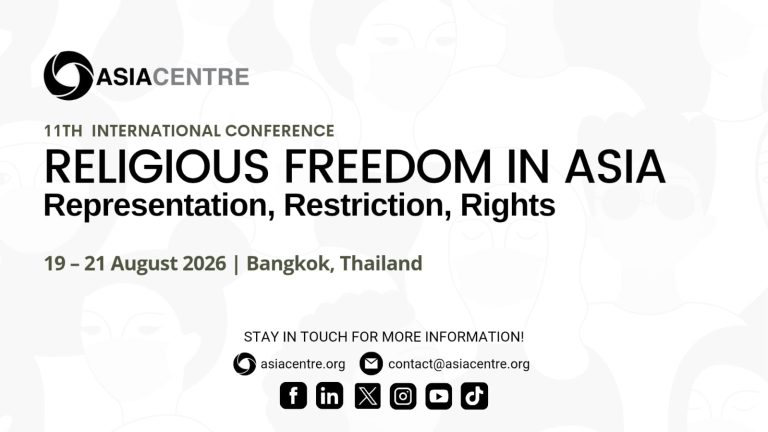
The Conference concluded with a celebration to mark Asia Centre’s 10th anniversary. Speakers and participants congratulated the Asia Centre team for a successful first decade, expressing their confidence that Asia Centre will continue to do well in the coming years.
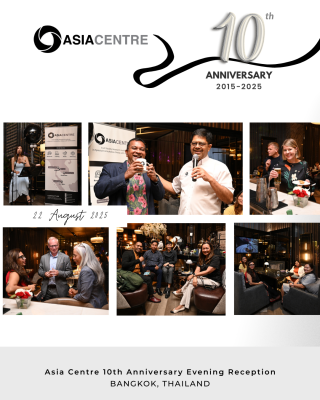
Watch TikTok highlights of the event here.
Several participants and organisations also wrote about Asia Centre’s 10th International Conference. On August 22, TaiwanICDF highlighted on its official website about AI-powered development initiatives in partner countries, emphasizing the importance of human-centered AI tailored to local conditions. On August 26, Fundasaun Hadomi Timor (FHT) shared on Hadomi Timor website, his reflections on the conference, outlining Timor-Leste’s digital challenges and aspirations for AI integration. On August 28, International IDEA published an article at its official website, by Billie Phillips, Communication and Outreach Officer, IDEA, discussing how AI is transforming democratic processes and advocating for ethical, inclusive electoral governance, highlighting the launch of Asia Centre’s new AI Hub for Civil Society Organisations to build capacity and strengthen engagement. Finally, on September 4, Aliran published an op-ed by Tan Wah Piow, critiquing AI discourse for sidelining the economic rights of the world’s poorest communities and calling for a broader, justice-oriented approach to human rights. These publications by participants and partnering organisations underscore the conference’s importance and reach across Asia and beyond.
Asia Centre’s International Conference is its flagship annual gathering, designed to bring partners together to present outcomes, share expertise, and develop future collaborations. Over the years, it has become a trusted space for open dialogue on democracy and human rights in Asia. To explore collaboration opportunities, contact contact@asiacentre.org. For more information, click here.
Asia Centre is a civil society research institute in Special Consultative Status with the United Nations Economic and Social Council. It serves as a knowledge partner and undertakes evidence-based research as well as provides capacity-building training for end beneficiaries. If you would like to collaborate with the Centre, please send an expression of interest to contact@asiacentre.org. Follow Asia Centre’s social media channels for updates.

